
If there’s one man who knows how to eke every last bit of performance out of a flat tracker, it’s Richard Pollock. The man known as Mule has been building (and racing) them since long before Bike EXIF was even conceived, and has built some of the most lust-worthy trackers to ever grace these pages. So it’s little wonder that his latest creation—a full-throttle Hooligan flat track racer—is such a tour de force.
If you’re not familiar with the American Grand National Hooligan Championship, it’s a flat track series aimed at amateurs running highly hopped-up street bikes. The rules are straightforward; you can run any street-legal production bike over 649 cc, with an open book on motor, swingarm, and wheel mods. But you can’t cut and weld the steering neck to alter the geometry, and you can’t change the shock mounts on the frame’s side unless they’re bolt-ons.

There’s a 370 lbs minimum weight limit too, and each bike needs a wheelbase of at least 56 inches. From there, it’s up to each racer to find creative ways to make their bike go faster and turn left harder. Luckily for Mule, he’s been at this long enough to know all of the workarounds.
“Having raced the Hooligan class every year since 2018 on a Sportster-based bike, I decided to build the ultimate class-legal bike for this year,” he tells us. “Given the constraints, my goal was to smash the minimum weight rule and reach the point of having to add weight.”
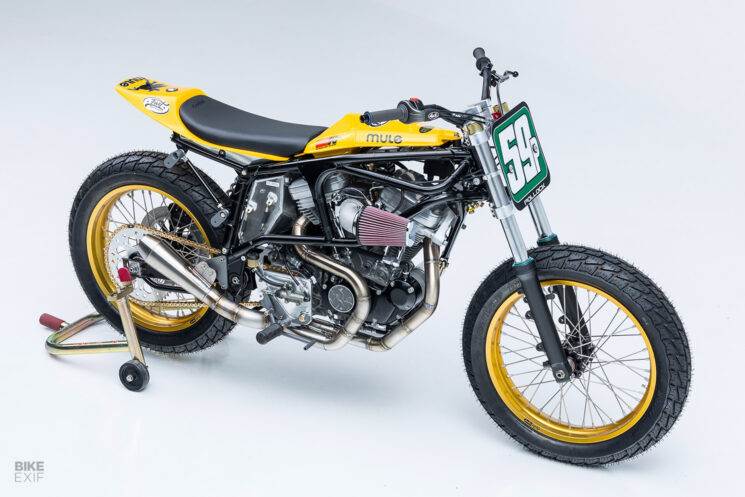
Mule started by sourcing a Buell X-1 Lightning from eBay, chosen specifically for its main frame loop. “It’s 10 lbs lighter than the lightest Sportster frame,” he explains, “and features a removable cast aluminum subframe, which I wouldn’t use anyway.”
With the Buell stripped down to its bones, Mule began to work his magic. First, he fabricated a lightweight chromoly swingarm and subframe, with a bolt-on upper shock mount. A friend and ex-colleague from his days in the aerospace industry helped, by 3D-printing prototype shock mounts until the design was perfect.
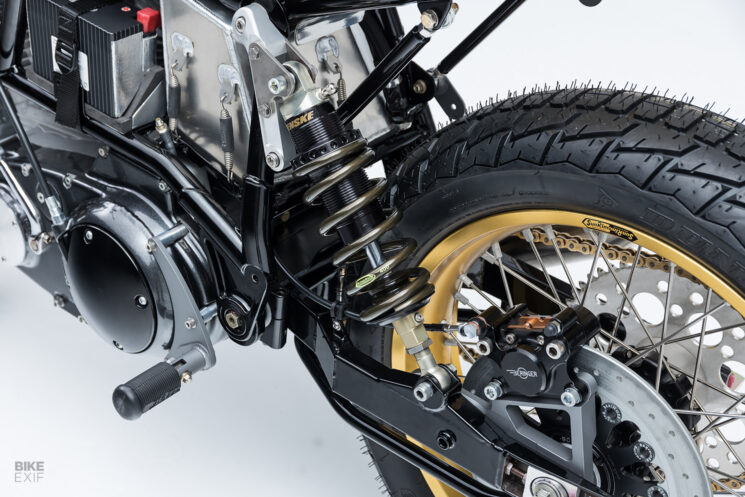
The mounting system uses titanium plates, bolted to the upper end of a custom-made Penske shock. It’s a trick setup, but it distracts from an even more trick modification that’s lurking lower down.
“In the original Buell street bike, the motor and aluminum swingarm pivot castings were rubber mounted,” Mule explains. “Now the motor is rigid-mounted, incorporating a billet swingarm and rear motor mount that allows full adjustability of the motor placement within the frame. Fore, aft, up, down, and axial rotation; bam, how you like me now?”
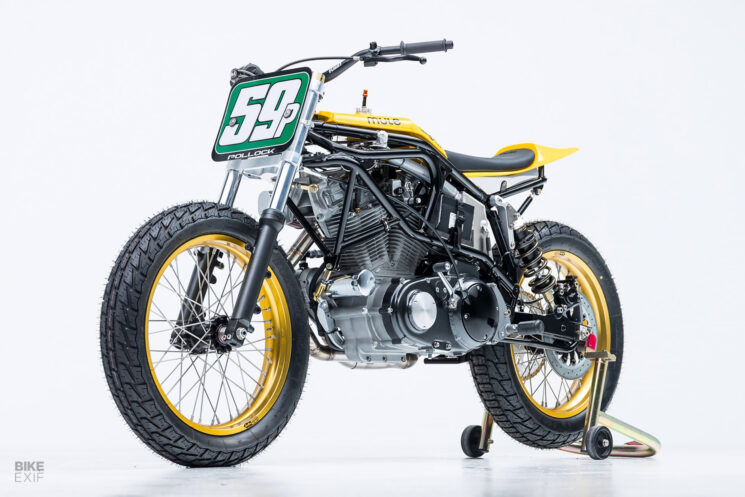
At the opposite end of the bike, a set of Mule Motorcycles yokes grip Yamaha R6 forks, fitted with steel cap extensions from J.J. Flairty. The wheels use Durelle Racing hubs, Sun rims, stainless steel spokes, and Dunlop DT4 tires. The rear brake uses a Beringer caliper and rotor, with the former mounted on a Mule caliper bracket.
The rear wheel hub also features a custom internal spud that not only allows easy gearing changes, but also allows Mule to ‘flip’ the rear wheel between races. The idea is to ensure even wear across the tire’s tread, since flat trackers are always torching the left side of the rubber.
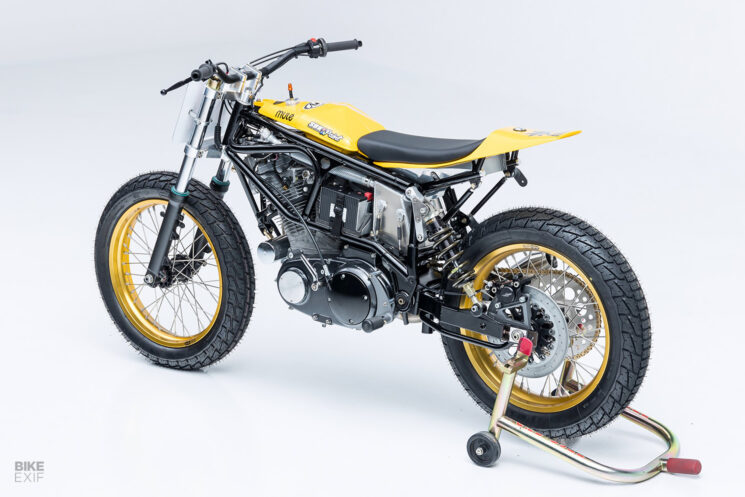
Mule has a go-to list of engine mods that balance power and reliability, so he threw the book at the V-twin mill. The crankcases and crankshaft went off to Dark Horse Crankworks for heavy-duty rods, fresh bearings, balancing, and assembly. The top end was sent to Branch & O’Keefe in California for extensive head mods, proprietary pistons, and boring.
The displacement is still 1,200 cc, but the engine now sports Red Shift cams, Jim’s Machining roller rockers, and a Dyna ignition. The stock carb was rebuilt and modded by Randy Troy Carburetion Specialties. It’s fed air by a ForceWinder intake and a K&N filter, offering a lot more right knee clearance than the OEM air cleaner.
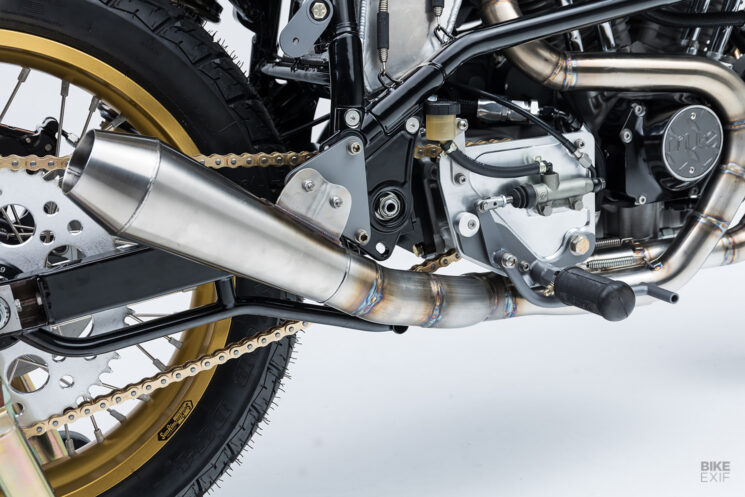
Since the hooligan tracks are generally short, Mule never gets beyond second gear. So this race bike uses a two-speed transmission with a Barnett Scorpion clutch, shaving another 12 lbs. “The motor features plenty of torque and huge pulling power, so it can easily pull much higher final gearing if necessary,” he adds.
Keen eyes will notice that the bike’s primary cover is not quite original. The OEM clutch cable attachment sits really low and has a habit of snapping off in the event of a lowside. So Mule cut the cover, rotated it about 45 degrees, and then welded it back, effectively keeping the cable’s attachment point out of harm’s way.

The modification called for fine work, so Mule used a wire EDM cutter to split the primary cover. It’s a machine commonly used in aerospace fabrication since it only removes about 0.01” of material. The front half of the case was also cut and shut, and fitted with a custom cover.
“The cover facilitates precision ignition timing as opposed to the ‘factory caveman’ way of putting the bike in gear and rocking the wheel back and forth while peaking in a little inspection hole,” Mule tells us. “It still takes two people, but it works a charm. Yes, there are other ways to do it… but this is my way.”
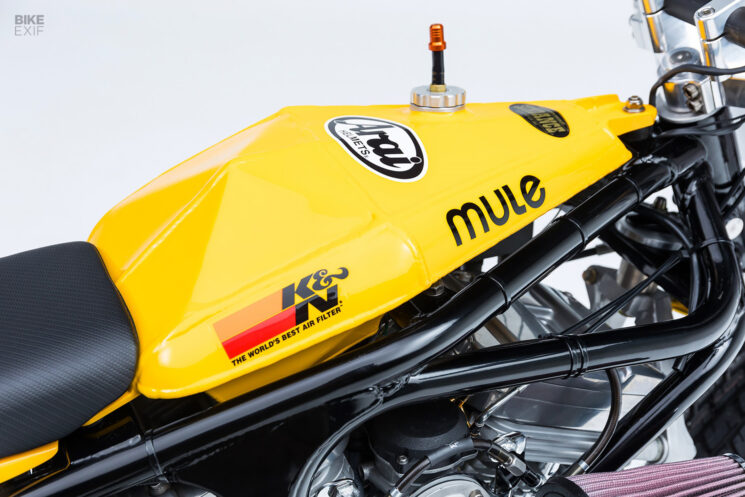
Most notably, this flat tracker wears the least bodywork we’ve ever seen on a Mule build. A wafer-thin aluminum fuel tank sits on top of the frame, made up of several pieces, including a couple of radiused sections from a vintage Husqvarna fuel tank. Welded up by Mule’s friend, Chuck Connell, it holds just 1.3 gallons of fuel—enough for the brief, yet furious, races that the bike will undertake.
A custom oil tank sits further back, with its filler cap located up front, mounted on a long hose. The spigot that connects the hose to the reservoir, and the oil tank breather, are both placed inboard of the frame—so there’s nothing that can get in the way of the rider’s leg.
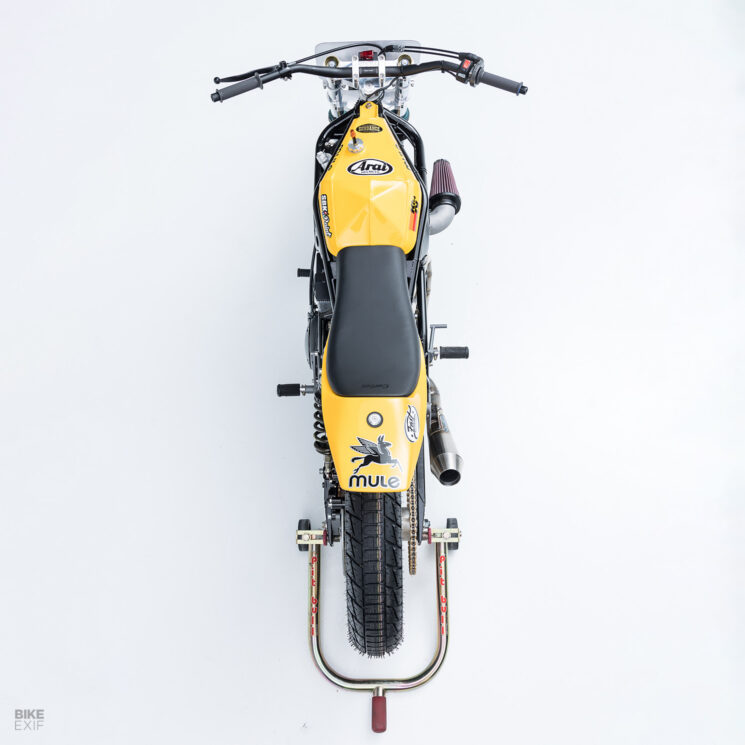
Finishing touches include a burly two-into-one exhaust, a fiberglass tail section from Competition Sheet Metal, and a handmade cushion from Corbin. The cockpit is a typical Mule affair—packed with only the essentials and super-duper tidy.
But the best aspect of this build is the way that the minimalist bodywork adds just a sliver of zest to a beast that unapologetically puts its mechanical nature on display. Laid down by SBK Paint, it’s a no-nonsense livery for a no-nonsense machine.
Mule Motorcycles | Instagram | Images by Bart Cepek
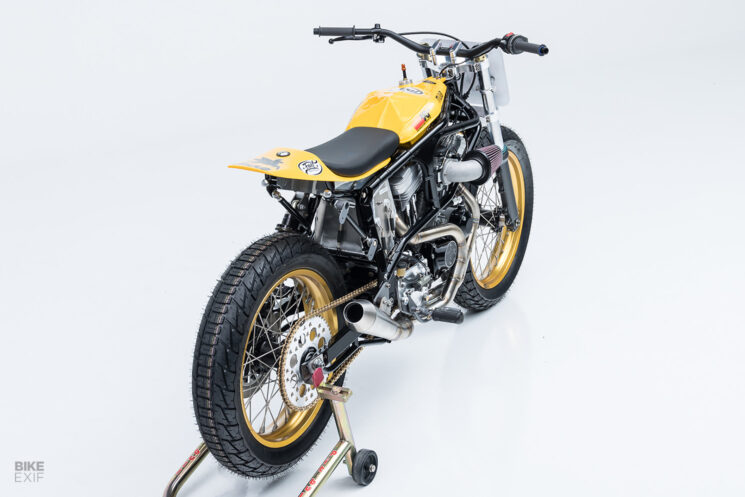
from Bike EXIF https://ift.tt/v8ZFuhE
No comments:
Post a Comment